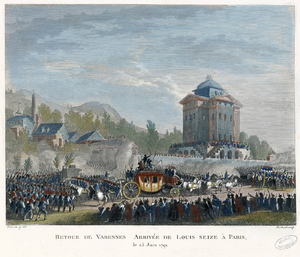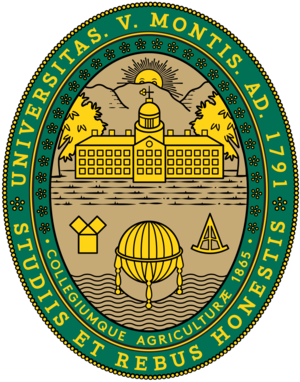Many thanks to our Patrons who cover ~2/3 of our hosting bill. Please join them if you can.
1791
Jump to navigation
Jump to search
1781 < 1782 < 1783 < 1784 < 1785 < 1786 < 1787 <1788 < 1789 < 1790 < 1791 > 1792 > 1793 > 1794 > 1795 > 1796 > 1797 > 1798 > 1799 > 1800 > 1801
 The French royal family tries to escape, but is captured and forced to return to Paris. |
Contents
Events
- January 25 – The British Parliament passes the Constitutional Act 1791, splitting the old province of Quebec into Upper and Lower Canada.
- February 8 – The Bank of the United States, based in Philadelphia, is incorporated by the federal government with a 20-year charter and started with $10,000,000 capital.[1]
- March 13 – Thomas Paine's chief work Rights of Man (first part) is published in London.
- March – French Revolution: In France, the National Constituent Assembly accepts the recommendation of its Commission of Weights and Measures, that the nation should adopt the metric system.
- May 3 – The Sejm of the Polish–Lithuanian Commonwealth proclaims the Constitution of May 3, 1791, the first modern codified constitution in Europe.
- June 20 – French Revolution – Flight to Varennes: The French Royal Family is captured when they try to flee in disguise.
- June 21 – The Ordnance Survey is founded in Great Britain.[2]
- July 11 – The ashes of Voltaire are transferred to the Panthéon in Paris.
- July 14–17 – Priestley Riots against Dissenters in Birmingham, England.
- July 17 – French Revolution: The Champ de Mars massacre occurs in Paris.
- August 4 – The Treaty of Sistova is signed, ending the Ottoman–Habsburg wars.
- August 6 – The Brandenburg Gate in Berlin (Prussia) is finished.
- August 21 – Haitian Revolution: A slave rebellion breaks out in the French colony of Saint-Domingue.
- August 27 – Declaration of Pillnitz: A proclamation by Frederick William II of Prussia and the Habsburg Leopold II, Holy Roman Emperor, affirms their wish to "put the King of France in a state to strengthen the bases of monarchic government."
- Declaration of the Rights of Woman and of the Female Citizen is written by activist Olympe de Gouges in response to the Declaration of the Rights of Man and of the Citizen.[3]
- September 9 – The capital of the United States, Washington, D.C., is named after the incumbent 1st President George Washington.
- September 13 – French Revolution: Louis XVI of France accepts the final version of the completed constitution.
- September 28 – French Revolution: The law on Jewish emancipation is promulgated in France, the first such legislation in modern Europe.
- October 1 – French Revolution: The Legislative Assembly (France) convenes.
- October 28 – French Revolution: The Declaration of the Rights of Woman and of the Female Citizen is published in France.
- November 4 – St. Clair's Defeat, the worst loss suffered by the United States Army in fighting against American Indians, takes place in what is now Mercer County, Ohio. Miami fighters led by Chief Mihsihkinaahkwa (Little Turtle) and by Shawnee warriors commanded by War Chief Weyapiersenwah (Blue Jacket) rout the forces of General Arthur St. Clair and kill 630 U.S. soldiers, along with hundreds of civilians.[4]
- December 4 – The first issue of The Observer, the world's first Sunday newspaper, is published in London.
- December 15 – Ratification by the states of the first ten amendments to the United States Constitution is completed, creating the United States Bill of Rights. Two additional amendments remain pending, and one of these is finally ratified in 1992, becoming the Twenty-seventh Amendment.
- December 23 – The Pale of Settlement is established by ukase of Catherine the Great, specifying those areas of the Russian Empire in which Jews are permitted permanent residency.
Event
| Event | Start | End | Description |
|---|---|---|---|
| French Revolution | 5 May 1789 | 9 November 1799 | Often cited event in world history that has an even more brutal side to it than is usually discussed. |
A New Group
| Group | Image | Type | Description |
|---|---|---|---|
| University of Vermont |  | Flagship Land-grant Public Research | University in Vermont |
A Birth
| Title | Born | Died | Summary | Description |
|---|---|---|---|---|
| John Edward Taylor | 11 September 1791 | 6 January 1844 | Businessperson Editor | English business tycoon, editor, publisher who founded the The Guardian. |
Many thanks to our Patrons who cover ~2/3 of our hosting bill. Please join them if you can.
References
- ↑ Harper's Encyclopaedia of United States History from 458 A. D. to 1909, ed. by Benson John Lossing and, Woodrow Wilson (Harper & Brothers, 1910) p169
- ↑ http://www.charlesclosesociety.org/files/HistoryOSGB.pdf
- ↑ https://www.iep.utm.edu/gouges/ Internet Encyclopedia of Philosophy
- ↑ Robert M. Owens, Red Dreams, White Nightmares: Pan-Indian Alliances in the Anglo-American Mind, 1763–1815 (University of Oklahoma Press, 2015)